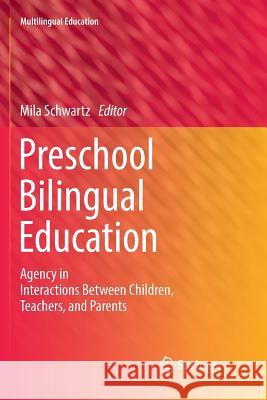Preschool Bilingual Education: Agency in Interactions Between Children, Teachers, and Parents » książka
topmenu
Preschool Bilingual Education: Agency in Interactions Between Children, Teachers, and Parents
ISBN-13: 9783030084042 / Angielski / Miękka / 2018 / 365 str.
Kategorie:
Kategorie BISAC:
Wydawca:
Springer
Seria wydawnicza:
Język:
Angielski
ISBN-13:
9783030084042
Rok wydania:
2018
Wydanie:
Softcover Repri
Numer serii:
000450976
Ilość stron:
365
Waga:
0.53 kg
Wymiary:
23.39 x 15.6 x 2.01
Oprawa:
Miękka
Wolumenów:
01
Dodatkowe informacje:
Wydanie ilustrowane











